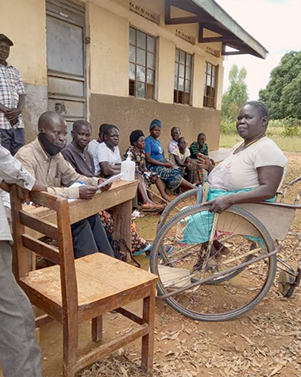Annual Update 2022 VNG International

Development of Action Plans for the inclusion of people with disabilities, during the participatory budgeting process in DRC in February 2022, with representatives of the national ministry, provincial ministry, civil society and chiefdoms.

Mapping exercise of people with a disability in Arua City and Terego Districts, Uganda in January 2022.
‘Because of the support of We are Able! we managed to get a project accepted in the budget by the chiefdom that targets people with a disability’.
Civil Society Representative in Buloho, DRC, after a participative budgeting meeting facilitated by VNG International
‘For the first time, we now know the actual number and disability types for three sub-counties of the district, which will help resource allocation for people with a disability and further lobbying with like-minded partners. We will now apply this approach to the whole district, for better planning and service delivery.’
Mr. Rashid Khalili Azabo,
the District Planner, Yumbe District Local Government, Uganda
improving Access to Basic Services
by strengthening democratic local government
Featured Project
Improving Access to Basic Services
We are Able!
In 2021 the implementation of the project ‘We are Able!’ started. Funded by the Dutch Ministry of Foreign Affairs, the project will run from 2021 to 2025 and is implemented by a consortium existing of VNG International, The Hague Academy for Local Governance, the Leprosy Mission, SeeYou Foundation, African Disability Forum and ZOA as the lead partner. The aim of this programme is to empower people with disabilities to the extent that they are successfully influencing laws, policies, practices and norms through engagement with public authorities to improve food security for all. The project runs in six countries: Burundi, Democratic Republic of Congo, Ethiopia, South Sudan, Sudan and Uganda.
Jointly with the Hague Academy for Local governance, VNG International is responsible for the implementation of outcome 3: ‘Local authorities are actively engaging with CSOs/OPDs to develop laws and practices and set norms for inclusive governance’
2021 was the first year of implementation of We are Able!. Despite challenges due to the COVID pandemic and fragile contexts in several programme countries, the first year of the programme has already marked several achievements.
Results achieved:
- An innovative approach was developed for this programme, based on the Dutch Local Inclusion Agenda (LIA). The LIA is a public authority’s own policy framework and action plan aimed at disability inclusion. It covers all life domains, so that public authorities’ policies and services take full account of all local residents, whether or not they have a disability. The best practices from the LIA in the Netherlands were translated into an approach for the six programme countries.
- In all countries a baseline study was executed, MoUs with partner authorities were signed, stakeholder mappings and field visits done and teams put in place.
- In the DRC, all partner municipalities developed specific indicators and targets to contextualise the Local Inclusion Agenda.
- In several countries a stakeholder mapping of all disability related actors in the implementation zones of We Are Able! was done. In Ethiopia, the mapping is currently extended to include international actors. This will feed into the Lobby & Advocacy strategy for WaA Ethiopia (to be formulated with all consortium partners). Uganda performed a mapping of people with disabilities to improve the documentation and data available of local governments in the implementation zone.
- Many local governments in all programme countries received trainings on disability inclusion. Action plans were developed by local authorities in the DRC which identify obstacles faced by people with disabilities in order to participate in the participative budget cycle. Concrete actions were formulated that can be implemented in the next 6 months to reduce accessibility barriers.